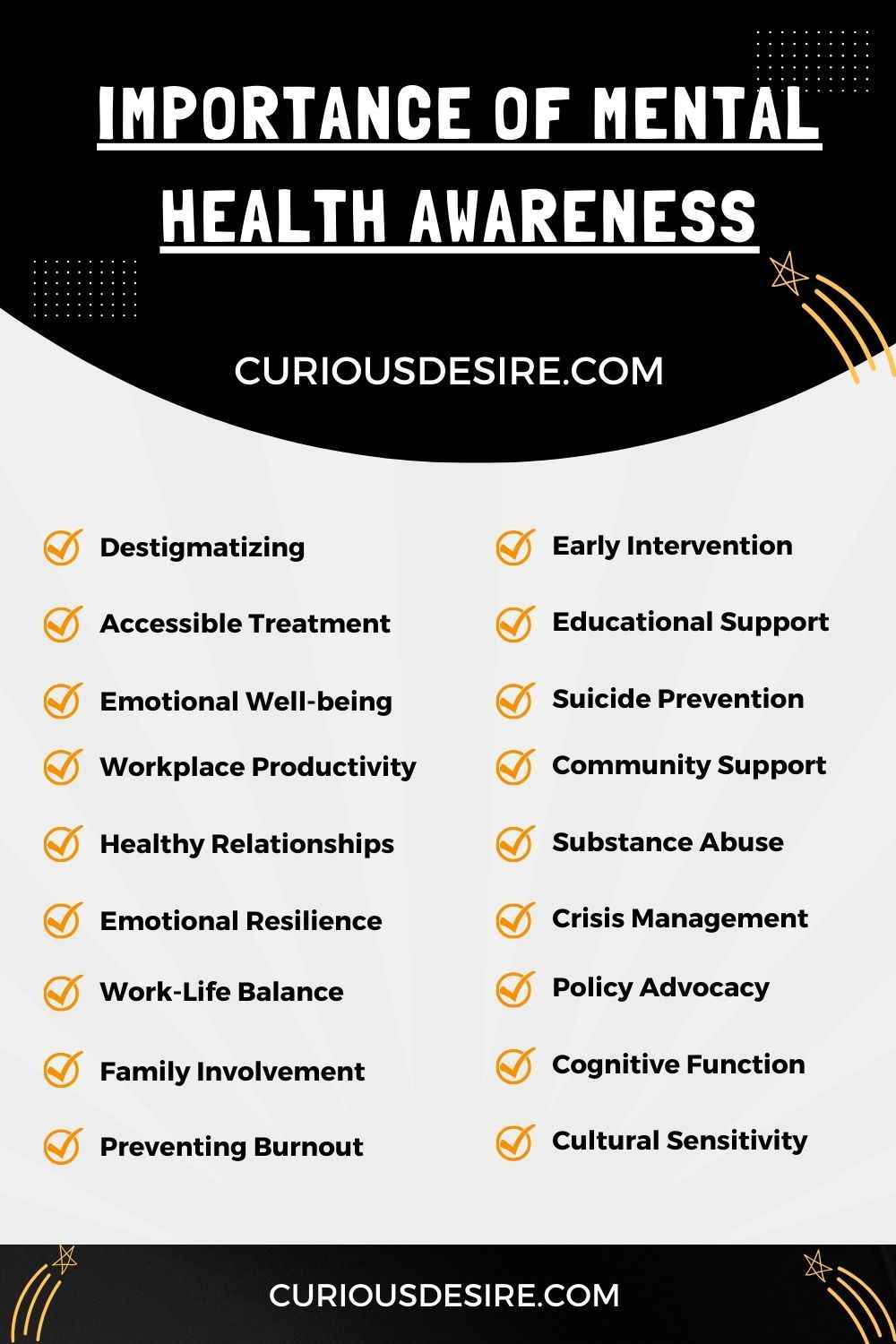In today’s world, the importance of mental health is widely recognized. It’s not just about not being sick; it’s about feeling good and being strong.
Just like taking care of our bodies, mental health is important for a fulfilling life. It helps us face challenges, build relationships, and reach our full potential.
Thinking about mental health isn’t only for those going through hard times. It’s like a guide to how we feel, think, and go about our days.
Talking openly about mental health helps break the stigma. Many suffer quietly due to misunderstandings. Mental health awareness aims to improve understanding and ensure everyone gets the care they need.
This article explores why mental health awareness matters for individuals, communities, and society.
Here are the 5 common reasons why mental health awareness is important:
- Emotional Well-being Promotion
- Suicide Prevention Awareness
- Early Intervention Strategies
- Community Support Initiatives
- Crisis Management Skills
1. Reducing Stigma
Reducing stigma around mental health is important as it encourages open conversations, making it easier for individuals to seek help without fear of judgment.
For instance, someone experiencing anxiety might hesitate to share their struggles due to societal stigma. They may fear being labeled as ‘weak’ or ‘incapable’ by others, making it harder for them to talk about or address their mental health concerns.
This fear can worsen their mental health issues, as they may avoid seeking professional assistance.
By promoting a stigma-free environment, we create a space where people feel comfortable discussing their mental health concerns and seeking necessary support.
2. Early Intervention
Early intervention is super important because it’s like catching problems when they’re small instead of waiting until they become big and tricky.
For example, if someone is feeling really down a lot (that’s depression), it’s better to get help sooner rather than later. It’s like fixing a small crack in a vase before it shatters.
To overcome it, keep an eye out for changes in how you or others feel. If something seems off, talk about it with someone you trust, like a friend or family member.
Don’t wait – getting help early, like talking to a counselor or finding activities that make you happy, can make a big difference.
3. Treatment Accessibility
Having easy access to treatment is important because it means that anyone needing help can easily get it. Consider a student overwhelmed by school stress – having easy access to a school counselor is like having a key.
They can talk to someone who helps manage stress and find healthy coping strategies. This accessibility to treatment is a game-changer for mental health. It’s similar to catching a cold early; addressing the issue before it worsens.
This quick support can lead to more effective coping strategies, ultimately improving overall mental well-being.
4. Enhanced Well-being
Feeling good overall, mentally and emotionally, is what enhanced well-being is all about. Doing things like mindfulness or activities that bring joy can help.
When people focus on their mental health and do things that make them happy, it can make a big difference. It reduces stress, lifts mood, and creates a positive mind.
For example, imagine someone who loves painting. When they paint regularly, it’s like a happy break for their mind, bringing a sense of achievement and joy. This contributes to their overall well-being, making life a bit brighter.
5. Workplace Productivity
Maintaining good mental health is important for workplace productivity because our emotions directly impact our work performance.
When someone is stressed or overwhelmed, concentrating on tasks becomes a significant challenge. For instance, think about a team member facing high stress due to tight project deadlines.
The pressure might impact their ability to think clearly and make efficient decisions, affecting their output and potentially slowing down the entire team.
Creating a work environment that values mental health, such as incorporating regular breaks and support systems, operates similarly to fine-tuning a well-functioning engine.
6. Academic Performance
Maintaining good mental health is important for academic performance because how students feel impacts their ability to learn and succeed.
When students feel stressed or worried, it’s like having too many roadblocks to learning. But if schools help students with stress and provide ways to feel better, it’s like having a friendly guide.
Schools that promote mental well-being through support services and stress reduction strategies often witness improved student performance.
Students can then concentrate more, do better in their classes, and feel proud of what they achieve. It’s like making school a happy and successful place to be!
7. Suicide Prevention
Promoting mental health awareness is important for suicide prevention. When individuals feel overwhelmed or isolated, addressing their mental health struggles becomes critical.
Encouraging open conversations, reducing stigma, and providing accessible mental health resources can contribute significantly to preventing suicide.
8. Positive Relationships
Building and nurturing positive relationships is like planting seeds for good mental well-being. When individuals have strong connections with others, it’s like having a safety net for their emotional health.
For example, picture a family that spends quality time together regularly. They share laughter, support each other, and create a warm environment. This family bond contributes to a strong sense of belonging and emotional stability for each member.
Positive relationships, whether with friends or family, act like anchors, providing comfort and support during both happy and challenging times.
9. Community Support
Community support is like a safety net for mental health. When people in a community join hands to offer resources, spread awareness, and show understanding, individuals dealing with mental health challenges feel a strong sense of support.
Imagine a town where people organize mental health workshops and share helpful information – it’s like creating a supportive atmosphere.
This kind of community support goes beyond just talking – it includes practical help, like organizing therapy sessions or creating safe spaces for conversations.
10. Substance Abuse Prevention
Taking care of mental health is like putting a lock on the door to prevent substance abuse. Sometimes, when people feel overwhelmed or down, they might turn to substances like drugs or alcohol to find relief.
By spreading awareness about mental health and giving support for handling stress and emotions, communities act like a shield against substance abuse.
It’s a bit like offering alternatives and helping people find healthier ways to deal with their feelings, reducing the risk of turning to substances for comfort.
11. Crisis Management Skills
Having crisis management skills is like being a real-life superhero in tough times. It’s important because life can throw unexpected challenges our way, and knowing how to handle them calmly can make a huge difference.
For instance, imagine someone at work suddenly facing a major problem, like a project falling apart. Crisis management skills would be like having a reliable guide to find solutions and preventing the situation from getting worse.
These skills are important in both personal and professional life, helping us smoothly handle difficulties with confidence and efficiency.
12. Developing Emotional Resilience
Growing emotional resilience is important because life can surprise us, and being emotionally resilient is like having a special strength to handle those surprises.
It helps you deal with the ups and downs of life with more strength and a positive attitude. Imagine a regular day when you face a tough situation, maybe not doing well on a test.
Having emotional resilience is like saying, “Okay, I didn’t do great this time, but I can learn and do better next time.” It’s about not letting one tough moment ruin your whole day.
13. Advocacy for Mental Health Policies
Advocating for mental health policies is like speaking up to make things better for everyone’s feelings. Imagine a place where people don’t talk much about mental health – advocating is like asking for rules that make sure everyone can get the help they need.
For instance, think about a school without someone to talk to when you feel sad. Advocacy is like saying, “We need someone here to help students feel better and understand their feelings.”
It’s important because it helps create a community where mental health is taken seriously. So, advocating for mental health policies is like making sure everyone has a chance to feel good and get help when they need it.
14. Encouraging Work-Life Balance
Encouraging work-life balance is like helping yourself find the right rhythm between your job and personal time. It’s important because it keeps you from feeling overwhelmed and tired.
Picture someone constantly overwhelmed with work – promoting work-life balance is like encouraging them to take breaks, spend time with family, and enjoy activities they love, preventing burnout.
Importantly, work-life balance is like giving your mind and body a reset button. It helps reduce stress, keeps you energized, and ensures you have the time and space for things that bring you joy.
15. Cognitive Function and Mental Health
Understanding the link between cognitive function and mental health is important because it influences how our minds work. Cognitive function involves thinking, memory, and decision-making – basically, how we process information.
Imagine someone dealing with constant stress – it’s like putting extra pressure on their cognitive function, making it harder to remember things and make good choices.
By valuing mental health, we ensure our cognitive function stays sharp. For example, practicing mindfulness or relaxation techniques can be like giving our minds a workout, helping us think clearly and make better decisions.
16. Family Involvement in Mental Health
Family involvement in mental health is like having a built-in support system. It’s important because families can play a significant role in an individual’s well-being.
For example, think of a teenager going through a tough time. Involving the family is like saying, “Let’s work together to understand and support them.” Families can provide emotional support, encourage treatment, and be there during difficult moments.
17. Cultural Sensitivity in Mental Health
Being culturally sensitive is like understanding that everyone sees mental health in their way. This helps us adapt and support each person uniquely, making sure our help fits into their daily life.
It’s about respecting different viewpoints and making support work better for everyone. For example, if a friend from another culture feels down, understanding their traditions helps offer support that fits their way of handling stress.
This makes mental health support more comfortable, reduces stigma, and helps everyone feel better in their way.
18. Preventing Burnout
Preventing burnout is like taking breaks during a long journey to stay energized. It’s important because constant stress can make you feel really tired and overwhelmed.
Preventing burnout is like recognizing when your work feels overwhelming, and saying, “I need short breaks to recharge.” It’s similar to realizing that taking moments for yourself during a busy day helps maintain energy and prevents feeling exhausted.
19. Holistic Health Emphasis
Emphasizing holistic health is like taking care of your mind and body together. It’s important because they’re connected – what’s good for one is good for the other.
Holistic health, like balanced nutrition and regular exercise, positively influences mental well-being. For instance, enjoying a nutritious meal not only benefits the body but also boosts mood, showcasing the interconnectedness.
Holistic practices, such as mindfulness and exercise, reduce stress, enhance emotional well-being, and contribute to a positive mental state. A holistic approach nurtures both physical and mental aspects, promoting overall well-being.
20. Empowering Individuals for Help-Seeking
Empowering individuals for help-seeking is like being a guide on their well-being journey, making asking for help natural and encouraged.
In daily life, encourage friends to talk openly when they feel down, reducing stigma and normalizing seeking help. A simple, “Hey, if you’re feeling down, it’s okay to talk about it,” can empower someone.
Share stories of friends facing challenges, seeking help, and finding solutions, highlighting that asking for support is a common and positive step.
This supportive approach creates an environment where well-being is prioritized, and seeking help is seen as a strength.
Strategies to Promote Mental Health Awareness
In our quest for a mentally healthy society, let’s uncover effective strategies to boost mental health awareness. The following strategies share practical tips to spark important conversations, diminish stigma, and extend support.
- Start Conversations: Open dialogue breaks down stigma, encouraging people to talk about mental health.
- Share Personal Stories: Personal narratives make mental health relatable, fostering understanding and empathy.
- Leverage Social Media: Utilize platforms to disseminate information, resources, and messages of support.
- Organize Educational Events: Seminars, workshops, and webinars provide platforms for learning and sharing.
- Collaborate with Mental Health Organizations: Partnering amplifies impact, reaching wider audiences and pooling resources.
- Implement Employee Wellness Programs: Prioritize mental health in the workplace through supportive initiatives.
- Advocate for Mental Health Days: Destigmatize taking time off for mental health by advocating for designated days.
- Community Workshops: Conduct educational sessions in local communities to reach diverse populations.
- Educate Schools: Work collaboratively with schools to integrate mental health education into the curriculum.
- Involve Families: Family involvement creates a supportive environment and extends awareness efforts.
- Collaborate with Healthcare Providers: Partner with healthcare professionals to share information and resources.
Conclusion
In everyday life, mental health awareness is like having a wise friend. It’s important because it understands and tackles tough feelings, making our days easier.
It’s not just about us; it spreads good vibes to everyone around. So, keeping an eye on our mental health isn’t just for us; it’s for making life better for everyone.
Let’s be our superheroes and keep mental health in mind for a happier and healthier journey!
Importance of Mental Health Awareness FAQs
1. Why is talking about mental health like having a good chat with a friend?
Sharing our mental health struggles is like opening up to a friend who listens and supports us, making us feel understood and less alone.
2. What makes understanding our feelings the secret sauce to a smoother life journey?
When we understand our emotions, it’s like having a secret sauce that helps us navigate challenges, making our journey through life less complicated and more enjoyable.
3. How is mental health awareness our superhero cape in facing tough times?
Mental health awareness acts as our superhero cape, providing the strength to face tough times, cope with difficulties, and emerge resilient.
4. Why is mental well-being not just about us but a gift that keeps on giving to everyone around us?
Prioritizing mental well-being is a gift that extends beyond ourselves, creating a positive ripple effect on our relationships and the people in our lives.
5. What makes keeping tabs on our mental health a cool way to spread good vibes?
Monitoring our mental health is cool because it spreads positivity; when we feel good, that positive energy radiates, impacting those around us in a cool and uplifting way.
6. How does mental health awareness turn us into the superheroes of our own stories?
Mental health awareness empowers us to take charge of our story, facing challenges like a superhero, equipped with self-understanding and resilience.
7. Why is making life better for everyone a fantastic bonus of being mindful about mental health?
Being mindful of mental health is a bonus, enhancing not only our well-being but creating a supportive environment that contributes to everyone’s happiness.
8. What transforms everyday challenges into adventures when we prioritize our mental well-being?
Prioritizing mental well-being turns challenges into adventures, reshaping how we perceive and approach obstacles, and transforming routine struggles into opportunities for growth and happiness.




